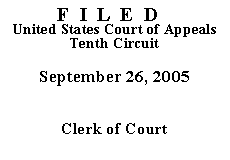

| UNITED STATES OF AMERICA,
Plaintiff-Appellee, v. THOMAS BROWN, Defendant-Appellant. |
|
|
(02-CR-20068-04-CM) (D. Kan.) | |
In Booker, the Court extended its decisions in Apprendi v. New Jersey, 530 U.S. 466 (2000), and Blakely v. Washington, 124 S.Ct. 2531 (2004), to the Federal Sentencing Guidelines, holding that the Sixth Amendment requires "[a]ny fact (other than a prior conviction) which is necessary to support a sentence exceeding the maximum authorized by the facts established by a plea of guilty or a jury verdict must be admitted by the defendant or proved to a jury beyond a reasonable doubt." 125 S.Ct. at 756. To remedy the potential for Sixth Amendment violations by a sentencing court's application of the Guidelines, the Court severed and excised 18 U.S.C. § 3553(b)(1), which had required sentencing courts to impose a sentence within the applicable guidelines range, subject to departures in limited cases. Id. at 764. As a result, the Guidelines are now advisory. Id. at 769.
We have recognized two types of Booker-related error. "First, a court could err by relying upon judge-found facts, other than those of prior convictions, to enhance a defendant's sentence mandatorily." United States v. Gonzalez-Huerta, 403 F.3d 727, 731 (10th Cir. 2005) (en banc). This type of error, which violates the Sixth Amendment as described in Booker, is generally referred to in this circuit as "constitutional Booker error." Id. "Second, a sentencing court could err by applying the Guidelines in a mandatory fashion, as opposed to a discretionary fashion, even though the resulting sentence was calculated solely upon facts that were admitted by the defendant, found by the jury, or based upon the fact of a prior conviction." Id. at 731-32. We refer to this type of error as "non-constitutional Booker error." Id. at 732.
Here, the district court committed constitutional Booker error because, even though Brown pled guilty to distributing 50 grams or more of methamphetamine, the district court found that he was actually responsible for 7.96 kilograms of methamphetamine. As a result, the district court imposed a base offense level of 36, rather than the base offense level of 26 that would have applied based solely on the amount of methamphetamine admitted to by Brown as part of his guilty plea. Brown did not, however, preserve this issue below. See United States v. Dazey, 403 F.3d 1147, 1173-74 (10th Cir. 2005) (holding that contesting the evidentiary bases for judge-found facts is not sufficient to preserve Booker error). Thus, we review only for plain error. Id. at 1174.
"Plain error occurs when there is (1) error, (2) that is plain, which (3) affects substantial rights, and which (4) seriously affects the fairness, integrity, or public reputation of judicial proceedings." Gonzales-Huerta, 403 F.3d at 732 (quotations omitted). Although Brown can, given the holding in Booker, easily satisfy the first two prongs of the plain-error test, see Dazey, 403 F.3d at 1174-75, we conclude he is unable to meet his burden of satisfying the third prong of the plain error test.
As noted, the third prong of the plain-error test focuses on whether the error was prejudicial, i.e., whether it "affected the outcome of the district court proceedings." Id. at 1175 (internal quotations omitted). We have held that, in cases involving constitutional Booker error, "there are at least two ways a defendant can make this showing." Id. "First, if the defendant shows a reasonable probability that a jury applying a reasonable doubt standard would not have found the same material facts that a judge found by a preponderance of the evidence, then the defendant successfully demonstrates that the error below affected his substantial rights." Id. "Second, a defendant may show that the district court's error affected his substantial rights by demonstrating a reasonable probability that, under the specific facts of his case as analyzed under the sentencing factors of 18 U.S.C. § 3553(a), the district judge would reasonably impose a sentence outside the Guideline range." Id. (footnote omitted).
Brown has not made either of these showings. Although Brown testified at the sentencing hearing and disputed the assertions of drug quantity made by the government's witnesses, we are unable to conclude there is a reasonable probability that a jury hearing the evidence and applying a reasonable doubt standard would not have made the same quantity determinations as the district court. Indeed, we note that Brown's own counsel did not object to the district court's drug quantity findings, and instead argued that, notwithstanding the large quantity of methamphetamine involved in the offense, Brown should receive a downward adjustment for being a minor or minimal participant. Further, there is no evidence in the record, such as statements from the district court at the time of sentencing expressing displeasure with the Guidelines range as applied to Brown's conduct, from which we could conclude that the district court would, on remand, reasonably impose a sentence outside the Guidelines range. Nor does Brown argue that any of the § 3553(a) factors could, given the facts of his case, reasonably be used to impose a lesser sentence.
Because Brown has failed to establish that his substantial rights were affected by the district court's constitutional Booker error, we conclude there was no plain error and thus no basis for remanding the case for resentencing.
We REINSTATE our previous Order and Judgment in this case and
AFFIRM Brown's sentence after reconsideration in light of Booker.
Entered for the Court
Mary Beck Briscoe
Circuit Judge
*.This order and judgment is not binding precedent, except under the doctrines of law of the case, res judicata, and collateral estoppel. The court generally disfavors the citation of orders and judgments; nevertheless, an order and judgment may be cited under the terms and conditions of 10th Cir. R. 36.3.